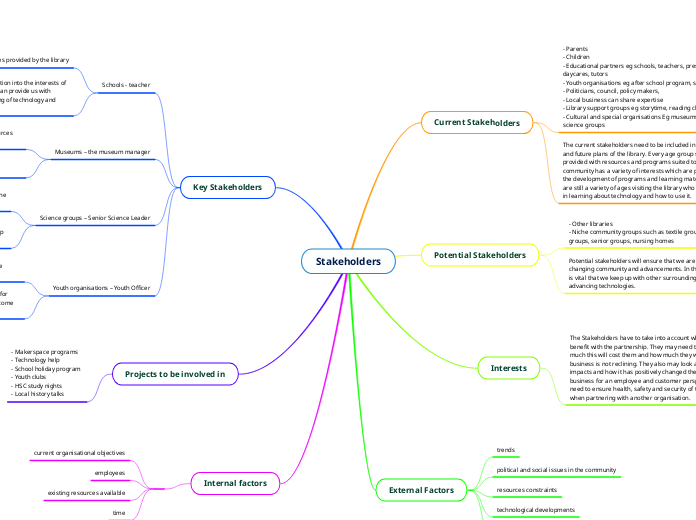Stakeholders
Current Stakeholders
- Parents
- Children
- Educational partners eg schools, teachers, preschools, daycares, tutors
- Youth organisations eg after school program, scouts,
- Politicians, council, policy makers,
- Local business can share expertise
- Library support groups eg storytime, reading clubs
- Cultural and special organisations Eg museums, arts centre, science groups
The current stakeholders need to be included in the current and future plans of the library. Every age group should be provided with resources and programs suited to their age. The community has a variety of interests which are prioritised in the development of programs and learning materials. There are still a variety of ages visiting the library who are interested in learning about technology and how to use it.
Potential Stakeholders
- Other libraries
- Niche community groups such as textile groups, technology groups, senior groups, nursing homes
Potential stakeholders will ensure that we are growing with the changing community and advancements. In the future plans it is vital that we keep up with other surrounding libraries and advancing technologies.
Interests
The Stakeholders have to take into account whether they will benefit with the partnership. They may need to determine how much this will cost them and how much they will profit so their business is not reclining. They also may look at the social impacts and how it has positively changed the outlook of the business for an employee and customer perspective. They will need to ensure health, safety and security of their organisation when partnering with another organisation.
External Factors
trends
political and social issues in the community
resources constraints
technological developments
customers
Key Stakeholders
Schools - teacher
Role: promote programs and resources provided by the library
Support: Teachers can give us information into the interests of children and young people. Teachers can provide us with statistics on their level of understanding of technology and skills.
Museums – the museum manager
Role: provide historical artefacts, information and resources for the library to exhibit
Support: Musuems can support libraries by providing resources and lending local historical materials
Science groups – Senior Science Leader
Role: help develop interesting programs and facilitate. Help the library staff and community to understand new technology.
Support: Science group can support and develop programs with the library to help empower all age groups. They can help develop technology classes for all ages.
Youth organisations – Youth Officer
Role: help to advise the library how to keep young people engaged and promote upcoming programs.
Support: Youth organisations can support and advocate for issues around young people and how to help them overcome them.
Projects to be involved in
- Makerspace programs
- Technology help
- School holiday program
- Youth clubs
- HSC study nights
- Local history talks
Internal factors
current organisational objectives
employees
existing resources available
time
